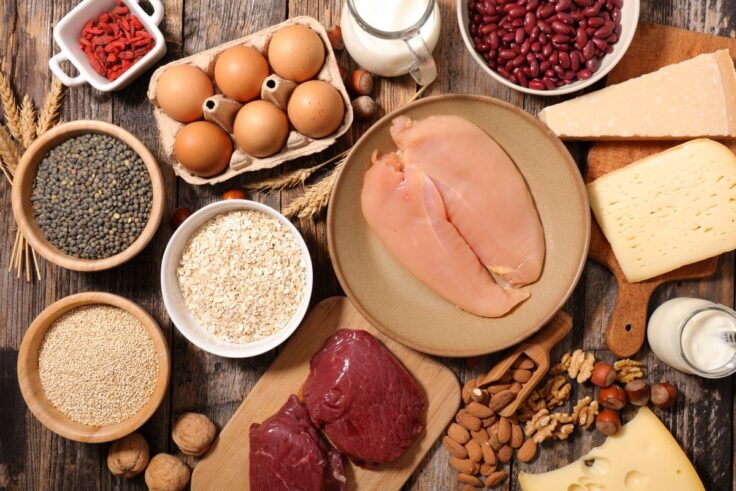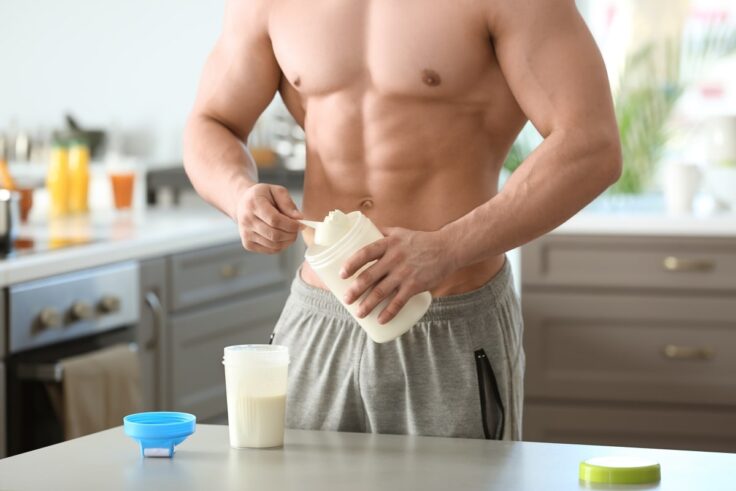High-Protein Diet: How Can It Affect Your Muscle Mass?

A high-protein diet can help build muscle mass, reduce hunger, boost metabolic rate, increase energy, promotes weight loss, and more. Here’s why it’s so effective.
If you exclude water and fat, protein is the most abundant substance in the human body. Scientists estimate that protein makes up around 16% of the human body’s weight, with muscles comprising 80% protein in the form of amino acids.
But why protein? What’s in this nutrient that gives weightlifters and marathon runners the edge in competitions?
The answers will require a bit of looking into the science of protein and its functions. After this, you’ll understand the need for a high-protein diet a little better.
Protein And Amino Acids
There’s a reason that proteins are the building blocks of the body. Almost everything, from muscle mass to antibodies, requires protein – at least, the stuff they carry.
Protein contains thousands of organic compounds called amino acids, usually left after protein is broken down.
The body needs 20 amino acids, nine of which are considered essential. Of these nine essential amino acids, three are heavily involved in muscle metabolism – valine, leucine, and isoleucine.
Valine stimulates muscle growth, while leucine and isoleucine are critical for muscle repair.
Don’t worry about looking for foods that are rich in these three; every known source of protein, from red meat to nuts, has them.
The human body can’t produce these amino acids innately, so it has to derive them from foods and other outside sources. Not getting enough protein can result in loss of muscle mass, which is also known as muscle atrophy.
High, But Not Too High
For protein, the Recommended Dietary Allowance (RDA) is at 0.8 grams per kilo of body weight.
However, according to the American College of Sports Medicine, general sports training increases RDA to between 1.2 and 1.7 grams per kilo of body weight. In both cases, the RDA is achievable through diet alone.
Can you go higher? You can, but it might not make much difference.
Researchers at the University of Kentucky in 2009 conducted a study to know if tripling the amount of lean beef consumed will increase protein synthesis. They found that both servings of 113- and 340-grams increased protein synthesis by 50% without any noticeable difference.
However, the story is different for those undergoing adequate training.
A study in 2015 by the U.S. Army Research Institute of Environmental Medicine looked into 38 articles that studied the effects of protein supplements among physically active adults. It found that the supplements won’t have as much impact on untrained individuals as on trained ones.
According to NSPNutrition and other supplement providers, a high-protein diet can work wonders when combined with a well-planned training regimen. In some cases, protein supplements can help people opting to go vegetarian or cut meat consumption.

Protein Isn’t Alone
While protein has most of what you’ll need to build muscle mass, protein alone won’t be enough.
First, the body can only synthesize so much protein in a given time, between 20 and 25 grams. The unused protein either gets stored in the fat reserves for later use or expelled through urine or feces.
You don’t want precious protein to go down the drain literally. That’s why experts suggest spacing protein intake over your meals.
Second, giving up on other nutrients like carbs and fats can risk losing stored protein. Without the right calorie intake, the body has to use up its fat reserves to compensate. Any protein tucked away there will get burned as fuel instead of going to the muscles. As one nutritionist puts it, you’ll be ‘burning the candle at both ends.’
Lastly, and perhaps the most important, the muscular system doesn’t run on protein alone. As it’s connected to other bodily systems, muscle growth will also need the help of other nutrients, like:
- Calcium – While primarily focused on bones and teeth, it also ensures muscle contraction.
- Iron – Lack of iron can limit oxidation, which your muscles perform continuously.
- Copper – It reinforces tendons to allow you to safely lift even the heaviest weights.
- Zinc – It promotes the production of testosterone, a muscle-building hormone.
- Vitamin B12 – It helps with the coordination between the brain and the muscles.
- Vitamin B2 – Also known as riboflavin, it helps break down proteins, carbs, and fat.
You don’t have to worry about where you’ll need to get these nutrients. A balanced diet of protein, fruits, and vegetables will provide all these nutrients and more.
Conclusion
When it comes to building muscle mass or sports training, protein is the star of the show. However, it has a host of other supporting nutrients that are also abundant in any high-protein diet.
The right foods and regular training will no doubt give you a competitive edge.